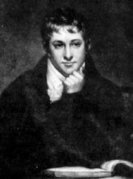Davy, Humphry (People)

Davy, Humphry
Humphry Davy (1778–1829), son of an impoverished Cornish woodcarver, rose meteorically to become a leader in the reformed chemistry movement initiated by Antoine-Laurent Lavoisier—albeit a critic of some of its basic premises—and a pioneer in the new field of electrochemistry.
Apprenticed to an apothecary-surgeon, Davy taught himself a wide range of other subjects: theology and philosophy, poetics, seven languages, and several sciences, including chemistry. In 1798 he took a position at Thomas Beddoes's Pneumatic Institution, where the use of the newly discovered gases in the cure and prevention of disease was investigated. Davy's earliest published work ("An Essay on Heat, Light, and the Combinations of Light," in Contributions to Physical and Medical Knowledge, Principally from the West of England, ed. Beddoes, 1799) was a refutation of Lavoisier's caloric, arguing, among other points, that heat is motion but light is matter. But his early reputation was made by his book Researches, Chemical and Philosophical, chiefly concerning Nitrous Oxide . . . and its Respiration (1799). His recommendation that nitrous oxide (laughing gas) be employed as an anesthetic in minor surgical operations was ignored, but breathing it became the highlight of contemporary social gatherings. In 1801 Davy was appointed—first as a lecturer, then as a professor of chemistry—to the Royal Institution in London, which he molded into a center for advanced research and for polished demonstration lectures delivered to audiences largely made up of fashionable gentlemen and ladies.
Soon after the Italian physicist Alessandro Volta announced the electric pile—an early type of battery—in 1800, Davy rushed into this new field and correctly realized that the production of electricity depended on a chemical reaction taking place. His electrochemical experiments led him to propose that the tendency of one substance to react preferentially with other substances—its "affinity"—is electrical in nature.
Among his many accomplishments, Davy discovered several new elements. In 1807 he electrolyzed slightly damp fused potash and then soda—substances that had previously resisted decomposition and hence were thought by some to be elements—and isolated potassium and sodium. He went on to analyze the alkaline earths, isolating Magnesium, calcium, strontium, and barium. Davy's recognition that the alkalis and alkaline earths were all oxides challenged Lavoisier's theory that oxygen was the principle of acidity. Later, Davy determined that not all acids contain oxygen—including muriatic acid (our hydrochloric acid), which, as Davy discovered, was not "oxymuriatic acid," as Lavoisier thought. It contained only hydrogen and one other element—chlorine.
In the course of his career Davy was involved in many practical projects. For example, he wrote the first text on the application of chemistry to agriculture and designed a miner's lamp that surrounded the lamp's flame with wire gauze to dissipate its heat and thus inhibit ignition of the methane gas commonly found in mines.
Davy became a fellow of the Royal Society in 1803 and served as its president from 1820 to 1827. He was knighted in 1812 and created a baronet in 1818—two honors, among many, that he much enjoyed.
Further Reading
- American Chemical Society
- Chemical Achievers: Humphry Davy, Chemical Heritage Foundation.
- Chemical Heritage Foundation
- Davy, Sir Humphry, Baronet, Hebrew University of Jerusalem, Institute of Chemistry.
- Historic Figures: Sir Humphry Davy, BBC Online.
- Society of Chemical Industry
- The Chemists' Club